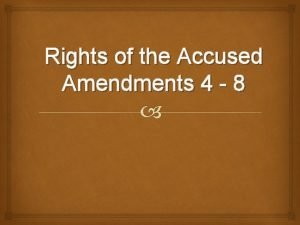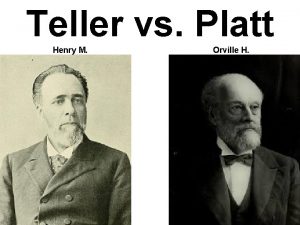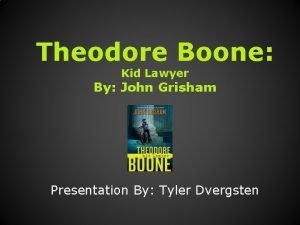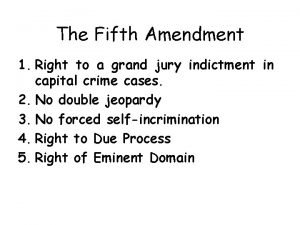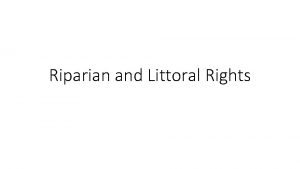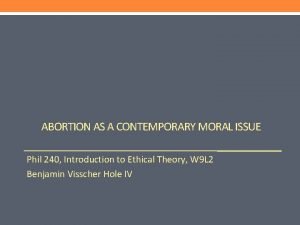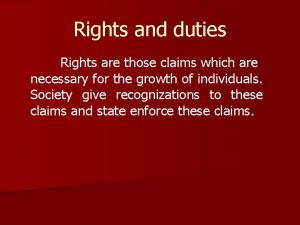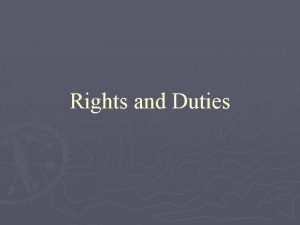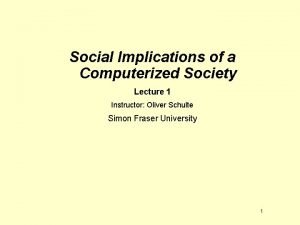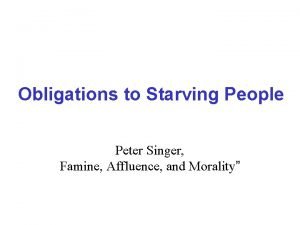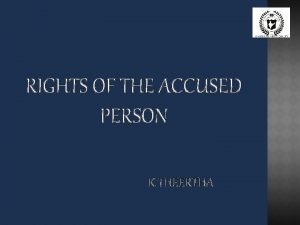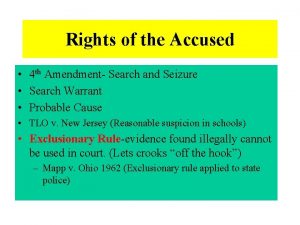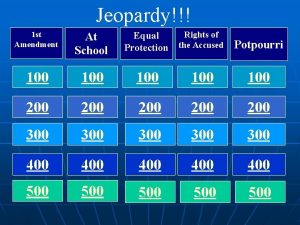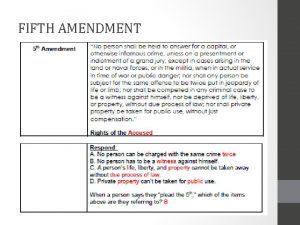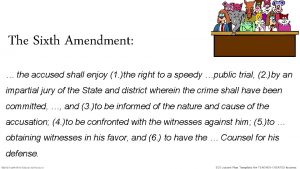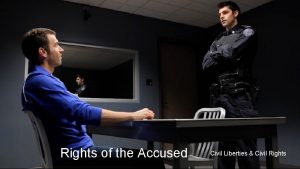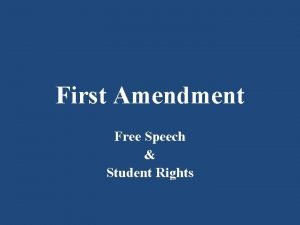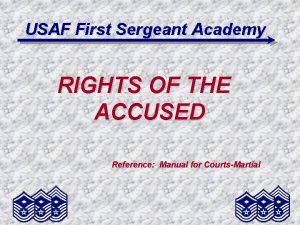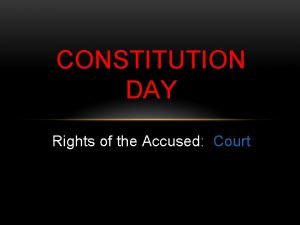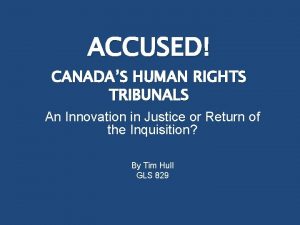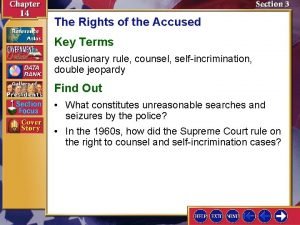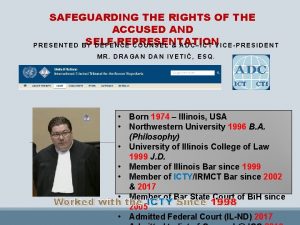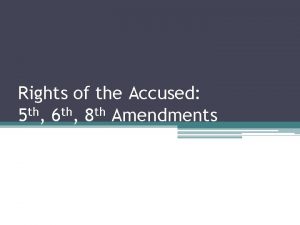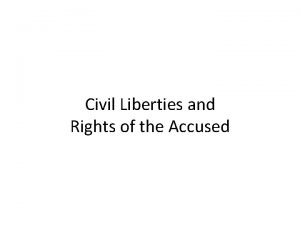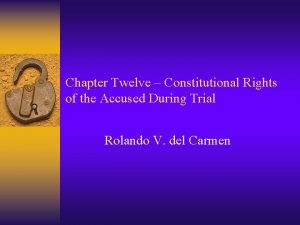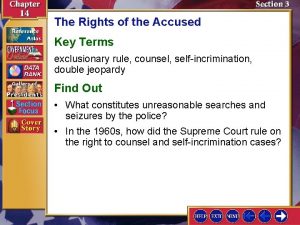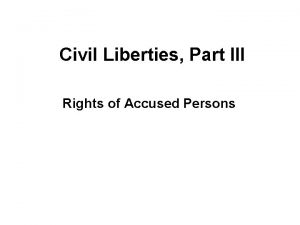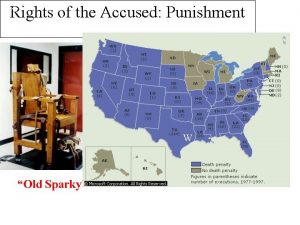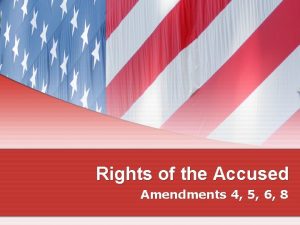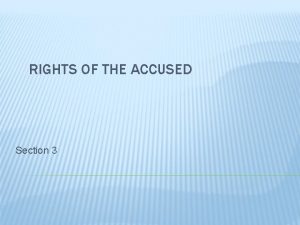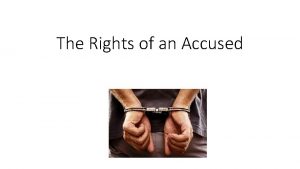Rights of the Accused 4 th Amendment Rights


























- Slides: 26

Rights of the Accused: 4 th Amendment

Rights of the Accused • The Constitution protects the innocent and the guilty. • Error is inevitable: • - guilty escape punishment • - guilty are punished more severely than • they should be • - guilty are punished less severely than • they should be • - innocent are punished

Why are there errors? 1. Eyewitness error: A. Reality distortions: * See wrong - emotional loading; perceptual distortions * Remember wrong – false memories; memory distortions * Confabulation (particularly with young witnesses) B. Lying – coached, “testilying, ” pressure, protect themselves, protect others, make themselves look good, attract attention, get back at an enemy C. Mistakes – simply human error, inadvertent misidentification D. Courtroom presentation issues – not precise, not articulate, lack creditability, nervous, emotional, intimidated on the witness stand retract statements/get rattled 2. Professional misconduct (police, prosecutor, judge): A. Inadvertent (human error) B. Intentional (fabricate, alter, suppress evidence) 3. Forensic science errors: A. Inadvertent (human error - mistakes made in the lab tests) B. Intentional (fabricate, alter, suppress evidence) 4. Racial and class bias 5. Use of jailhouse informants 6. False confessions - to protect others, pressure from others, obtain notoriety, beaten by police, psycho and think they did do it 7. Ineffective assistance of counsel

4 th Amendment Unreasonable searches and seizures Warrants Probable case Exclusionary Rule – evidence that is unlawfully seized is inadmissible at trial.

Core 4 th Amendment Cases • Weeks v U. S. - evidence illegally seized by a federal official cannot be used in federal court • Elkins v U. S. - evidence that is unlawfully seized by any official cannot be used in federal court; the exclusionary rule is applied to the federal courts • Mapp v Ohio – Exclusionary Rule applied to the states

4 th Amendment Cases and Principles • Mapp v. Ohio – Exclusionary Rule applied to the states • Mapp exemptions: U. S. v Havens (witness impeachment) - illegally seized evidence can be used to impeach a witnesses’ courtroom testimony Nix v. Williams (inevitable discovery exemption) - evidence that was illegally seized may be used in court if it can be shown that it would have inevitably been discovered Massachusetts v. Sheppard/U. S. v. Leon (good faith exemption) evidence seized by reasonably well-trained officers acting in good faith is admissible, even if the seizure technically violated the law

Search Warrant Components • Detailed, factual probable cause • Testified to by a creditable observer • Specify the address to be searched and the place at that address to be searched • Specify and classify the evidence to be seized (fruits of a crime, instruments of a crime, contraband, evidentiary property) • Specify the date and time • Specify who will execute the warrant • Signed by a judicial officer Wilson v. Arkansas (knock and announce) – even when armed with a warrant, the police generally must "knock and announce" before entering.

4 th Amendment Cases and Principles: Four categories of searches 1. Searches with warrants 2. Searches without warrants, but with probable cause 3. Searches without warrants, but with reasonable suspicion 4. Searches without warrants and no cause (pragmatic searches)

4 th Amendment Cases and Principles: No Warrant, Probable Cause Search Incident to Arrest – (Maryland v. Buie) : Officers may search the suspect and the adjoining space region incident to a lawful arrest; ; if there is reasonable suspicion to believe that there is hidden danger present, officers may conduct a protective sweep of the area, but it is only to be a cursory search for people and may last no longer than it takes to dispel the reasonable suspicion of danger Rochin v. California (exploratory searches): a search cannot be exploratory, it cannot be unreasonable, and it cannot shock the conscience

4 th Amendment Cases and Principles: No Warrant, Probable Cause…continued Plain View Search (Harris v. U. S. ) : If the officer is legally present, the offending objects are in plain view, and the incriminating nature of the item(s) is readily apparent, the items may be seized without a warrant (plain view doctrine) Consent Search: Lawful authority to search may be obtained without a warrant in a consent setting, as long as the following provisions are in place at the probable cause level: 1. Voluntary 2. Knowingly 3. Authority (those who have equal rights of access and privacy; reasonable access, legal ownership; mutual use, common access, common control) Illinois v. Rodriguez (apparent authority doctrine): If consent to search is given by someone who does not have the authority to do so, but the police reasonably believed they did, the evidence is still admissible in court. Florida v. Bostick (contextual randomized consent searches): Randomized consent searches of individuals who are on public transportation is acceptable, even though such searches carry some degree of implied coercion and are not truly voluntary; the governing test is whether a reasonable person feels free to decline an officer's request to search

4 th Amendment Cases and Principles: No Warrant, Probable Cause…continued Mobile motor vehicle searches (Carroll v. U. S. ): police may stop and search a potentially mobile motor vehicle without a warrant if there is probable cause to believe that the vehicle is carrying individuals or articles that offend the law. Related cases: * U. S. v. Ross: if there is probable cause to believe that a potentially mobile motor vehicle is carrying individuals or articles that offend the law, an officer may stop that vehicle and search every occupant of the vehicle, every part of the vehicle, and all of the contents found in the vehicle without a warrant, but, a Ross-type search is justified only if probable cause arises regarding a nontraffic offense violation. * Colorado v. Bertine: a vehicle that has been impounded by police officials can be searched in its entirety; all items found in any part the vehicle, including closed and locked items, may be searched.

Racketeering Influenced and Corrupt Organizations (RICO) Those fundamentally involved in/who had a primary participation in the operation and management of a criminal enterprise, are subject to RICO sanctions. • Enhanced criminal penalties – up to triple the statutory maximum penalties for their offenses • Forfeiture of tainted assets – assets obtained from or used in the criminal enterprise are at risk • Significant civil liability – those harmed (governmental entities, businesses, individuals) can collect triple damages for the harm sustained (ala civil recklessness – compensatory plus punitive)

RICO Civil Case Law • U. S. v. James Daniel Good: civil forfeitures under RICO are not automatic; they require a separate civil proceeding • Reves v. Ernst and Young: liability under RICO requires some fundamental involvement in/primary participation in the operation and management of the criminal enterprise • U. S. v. 92 Buena Vista Avenue: assets forfeited under RICO are limited to those that were gained from and/or used in the criminal enterprise; tainted assets

RICO Criminal Law Component If the prosecution can show a pattern and practice of RICOrelated (terrorist and/or organized crime activities), the criminal penalties can be doubled or even tripled. A maximum penalty of 2 – 4 years, but with a pattern and practice demonstrated, can become a sentence of 6 – 12 years. This is related to the habitual offender law, though in that context, individuals must be convicted three or four times to receive the more strident penalty.

Search and Seizure, footnote What if the police find nothing in the search: * De Jure - the vehicle/place searched is to be returned back to the same condition it was found by the police prior to the search, at the risk of civil suit from the owner. * De Facto - Police often do not return the vehicle/place searched back to the same condition it was found by the police prior to the search.

RICO Today • RICO has been successfully used to break up organized crime syndicates and terrorist groups, respond to white collar frauds and illegal corporate practices (ie. , follow the money). • RICO has had the unintended impact of fueling profit oriented policing • Many prosecutors are opting to regularly go down the RICO civil forfeiture route instead of the criminal route because: ▫ it is easier than moving in the criminal court setting ▫ sanctions are still forthcoming (and many view being hit in pocketbook as a greater sanction) ▫ governments keep the seized assets (this has become a driving factor, for RICO forfeitures are a major government revenue source, a mainstay of many current governments budgets)

4 th Amendment Cases and Principles: No Warrant, Probable Cause Automobile Search Exception Delaware v. Prouse (no cause exception): police may conduct brief, scientifically random, suspicion-less/no cause searches of motorists at fixed roadside checkpoints looking primarily for drunk drivers.

Misc points 1. Items can be seized that are not explicitly noted in a warrant: * plain view * search incident to arrest * reasonable relationship 2. Once all items in a warrant are seized, the search is to stop. 3. Legal justification of searches and seizures can be accumulative. 4. Rochin v. California (again) – Search cannot be exploratory, cannot be unreasonable, cannot shock the conscience. 5. Illinois v. Gates – Totality of the circumstances test

What is probable cause? Illinois v. Gates (totality of the circumstances test): taken piecemeal, the evidence may not amount to probable cause, but if the evidence reaches the probable cause level when considered as a whole, the legal standard of proof for a search has been met.

4 th Amendment Cases and Principles: Four categories of searches (so far) 1. Searches with warrants 2. Searches without warrants, but with probable cause a. Incident to arrest (Maryland v. Buie) b. Plain view (Harris v. U. S. ) c. Consent d. Mobile motor vehicle searches (Carroll v. U. S. ; U. S. v. Ross; Colorado v. Bertine; Delaware v. Prouse no-cause exception) Next Category: 3. Searches without warrants, but with reasonable suspicion (liberty v. order contexts) a. Stop and frisk/investigatory search - present and future tense concerns b. Stop and frisk/investigatory search - past tense concerns c. Special needs (pre-eminent public interest situations) * suspicion of being a drug courier * suspicion is present in a public school setting * suspicion is present in an airport setting * suspicion is present and the individual is on probation or parole * high crime areas (organic nature of the law; soft chalk) d. Pressing Situations: * emergencies * hot pursuit

4 th Amendment Cases and Principles: No Warrant, Reasonable Suspicion • Stop and Frisk Searches: Terry v. Ohio (present and future tense): a stop and frisk search may be conducted when there is reasonable suspicion to believe that an individual is now or is about to engage in criminal behavior U. S. v. Hensley (past tense): a stop and frisk search may be performed when there is reasonable suspicion to believe that the offender has violated the law, past tense • Special Needs Scenarios (pre-eminent public interest): U. S. v. Sokolow: an investigatory search may be conducted if the totality of the circumstances establishes reasonable suspicion to believe that a person matches the drug courier profile New Jersey v. TLO: reasonable suspicion is the standard to be used by public school officials to conduct searches on public school grounds of individuals who may be violating either the law or school rules Florida v. Royer: reasonable suspicion can be used as the basis for investigative searches and seizures in situations involving pre-eminent public interests; specifically, reasonable suspicion is the standard to be used to allow investigatory searches of individuals (passengers or nonpassengers) on airport grounds Griffin v. Wisconsin: reasonable suspicion is the standard to be used to search the dwelling of a probationer or parole No firm court case yet, but reasonable suspicion is emerging as the standard to be used in high crime areas • Pressing Situations: Emergencies, Hot Pursuit, Destroying Contraband

4 th Amendment Cases and Principles: Four categories of searches (so far) Searches with warrants 2. Searches without warrants, but with probable cause a. Incident to arrest (Maryland v. Buie) b. Plain view (Harris v. U. S. ) c. Consent d. Mobile motor vehicle searches (Carroll v. U. S. ; U. S. v. Ross; Colorado v. Bertine; Delaware v. Prouse no-cause exception) 3. Searches without warrants, but with reasonable suspicion (liberty v. order contexts) a. Stop and frisk/investigatory search - present and future tense concerns (Terry v. Ohio) b. Stop and frisk/investigatory search - past tense concerns (U. S. v. Hensley) c. Special needs (pre-eminent public interest situations) * suspicion of being a drug courier (U. S. v. Sokolow) * suspicion is present in a public school setting (New Jersey v. TLO) * suspicion is present in an airport setting (Florida v. Royer) * suspicion is present and the individual is on probation or parole (Griffin v. Wisconsin) * high crime areas (organic nature of the law; soft chalk) d. Pressing Situations: * emergencies * hot pursuit * destroying contraband 1. Last category: 4. Searches without warrants, and no cause or suspicion-less (liberty v. order contexts)

4 th Amendment Principles: No Warrant, No Cause or Suspicion-less Pragmatic Searches: • Border inspections • Customs inspections • Postal inspections • Airport baggage and airline passenger inspections • Custodial inspections (jails, prisons, police custody) • Garbage cans (California v. Greenwood) • Discarded property (California v. Hodari D) • Open fields (U. S. v. Dunn) • Un-inhabited buildings (U. S. v Dunn) • Military bases • Government vehicles • Aerial searches (Plain View search context) • Phones • Fixed roadside checkpoints

4 th Amendment Cases and Principles: Four categories of searches 1. Searches with warrants 2. Searches without warrants, but with probable cause 3. Searches without warrants, but with reasonable suspicion 4. Searches without warrants and no cause (pragmatic searches)

4 th Amendment Cases and Principles The seizure of an individual – ie. , an arrest • To effect an arrest, probable cause must be present (at a minimum) • Individuals may be arrested with a warrant (recall, a warrant requires detailed factual probable cause) • Individual's may be arrested without a warrant if probable cause is present • Probable cause can be defined as a series of actions that individually would not constitute probable cause, but taken together achieves that level (Illinois v. Gates - the totality of the circumstances test) • Individuals do not have to be verbally informed that they are under arrest to be legally under arrest. If they are in a police controlled environment and/or are not free to leave, they are considered legally, under arrest.

taken piecemeal, theevidence may not amount to probable cause, but if the evidence reaches the probable cause level when 4 th Amendment Cases and Principles Yet Again: • Illinois v. Gates (totality of the circumstances test): taken piecemeal, the evidence may not amount to probable cause, but if the evidence reaches the probable cause level when considered as a whole, the legal standard of proof for a search has been met • Rochin v. California: a search cannot be exploratory, it cannot be unreasonable, it cannot shock the conscience
 Rights of the accused amendments 4-8
Rights of the accused amendments 4-8 Platt amendment vs teller amendment
Platt amendment vs teller amendment Oedipus rex costumes
Oedipus rex costumes Theodore boone kid lawyer characters
Theodore boone kid lawyer characters What options did an accused witch have in salem
What options did an accused witch have in salem What options did an accused witch have in salem?
What options did an accused witch have in salem? The lost leader is a veiled attack on
The lost leader is a veiled attack on Elizabeth proctor was accused because _____.
Elizabeth proctor was accused because _____. Nike sweatshop case study
Nike sweatshop case study Property rights amendment
Property rights amendment Riparian rights
Riparian rights Rosalind hursthouse
Rosalind hursthouse Characteristics of rights
Characteristics of rights Negative right
Negative right Legal rights and moral rights
Legal rights and moral rights Positive rights vs negative rights
Positive rights vs negative rights Negative rights vs positive rights
Negative rights vs positive rights What are negative rights
What are negative rights Hệ hô hấp
Hệ hô hấp Các số nguyên tố là gì
Các số nguyên tố là gì đặc điểm cơ thể của người tối cổ
đặc điểm cơ thể của người tối cổ Các châu lục và đại dương trên thế giới
Các châu lục và đại dương trên thế giới Chụp phim tư thế worms-breton
Chụp phim tư thế worms-breton ưu thế lai là gì
ưu thế lai là gì Thẻ vin
Thẻ vin Tư thế ngồi viết
Tư thế ngồi viết
